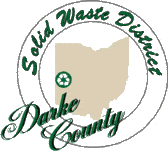Composting in Darke County
What is Composting?
Compost is organic material that can be used as a soil amendment or as a medium to grow plants. Mature compost is a stable material with a content called humus that is dark brown or black and has a soil-like, earthy smell. It is created by: combining organic wastes (e.g., yard trimmings, food wastes, manures) in proper ratios into piles, rows, or vessels; adding bulking agents (e.g., wood chips) as necessary to accelerate the breakdown of organic materials; and allowing the finished material to fully stabilize and mature through a curing process.
Natural composting, or biological decomposition, began with the first plants on earth and has been going on ever since. As vegetation falls to the ground, it slowly decays, providing minerals and nutrients needed for plants, animals, and microorganisms. Mature compost, however, includes the production of high temperatures to destroy pathogens and weed seeds that natural decomposition does not destroy.
![]()
Yard trimmings and food residuals together consitute 23 percent of the U.S. waste stream, as documented by EPA. An estimated 56.9 percent of yard trimmings were recovered for composting or grasscycled in 2000, a dramatic increase from the 12 percent recovery rate in 1990. Accompanying this surge in yard waste recovery is a composting industry that has grown from less than 1,000 facilities in 1988 to nearly 3,800 in 2000.
All composting requires three basic ingredients:
Browns - includes materials such as dead leaves, branches, and twigs.
Greens - Includes materials such as grass clippings, vegetable waste, fruit scraps, and coffee grounds
Water
How to Start Composting:
1. Select a dry, shady spot near a water source for your compost pile or bin.
2. Add your brown and green materials as you collect them, making sure larger pieces are chopped or shredded.
3. Moisten dry materials as they are added.
4. Once your compost pile is established, mix grass clippings and green waste into the pile and bury fruit and vegetable waste under 10 inches of compost material.
5. Optional: Cover top of compost with a tarp to keep it moist.
6. When the material at the bottom is dark and rich in color, your compost is ready to use (this is usually achieved in two months to two years).
|
|
|
What You SHOULD NOT Compost -- Black Walnut Tree Leaves or Twigs - Releases substances that might be harmful to plants. Coal or Charcoal Ash - Might contain substances harmful to plants. Dairy Products - Creates odor problems and attract pests such as rodents and flies. Pet waste - Might contain parasites, bacteria, germs, and pathogens. |
NOTE: Finished compost can be applied to lawns and gardens to help condition the soil and replenish nutrients. Compost, however, should not be used as potting soil for houseplants because of the presence of weed and grass seeds.

 Sign-Up for District Updates
Sign-Up for District Updates 